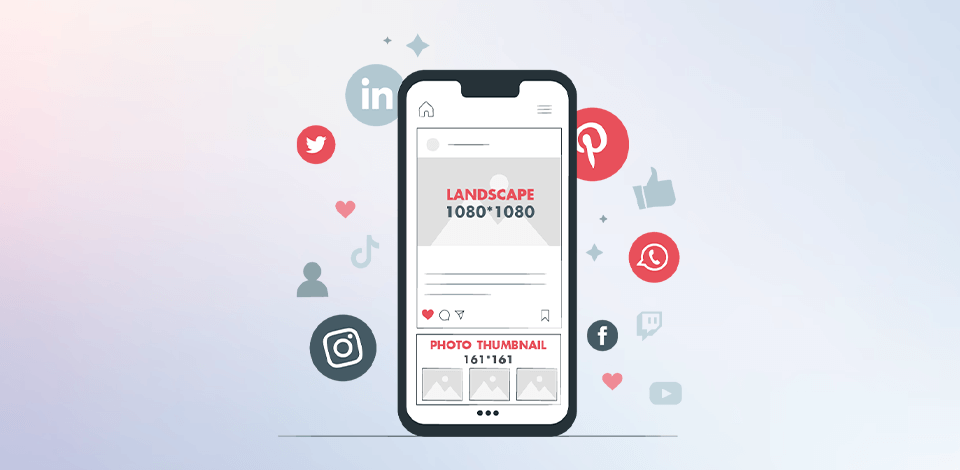
Recent studies suggest that a little over 63% of enterprises largely depend on video and image content as the key component of their marketing efforts. Ensuring your visual assets look great across all widely used social platforms for photographers from Facebook to Pinterest can be a rather difficult task if you don’t know what are the best social media image sizes for each platform.
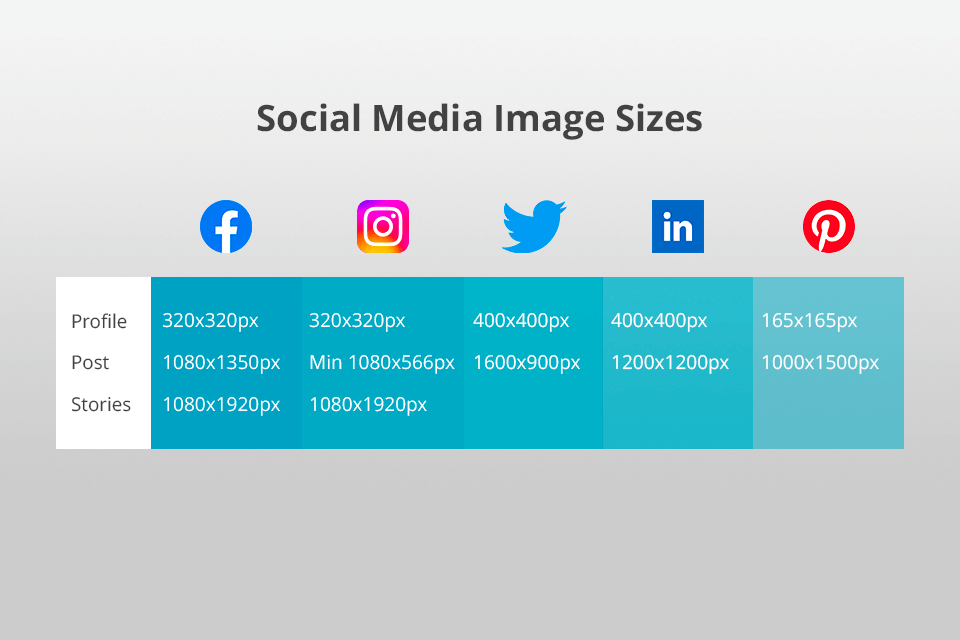
The post below offers a rundown of all the recommended image sizes for social media. Typically, you can also upload images that are bigger than that as long as you keep the same aspect ratio and check if it’s being displayed properly afterward.
View all info on the official site
Facebook content requirements let you take advantage of a wider range of social media post sizes than any alternative popular platform. Other than timeline images, you’ll probably also want to create other visual content for social media, such as cover pictures, profile avatars, and clips. You might also be interested in posting stories and reels.
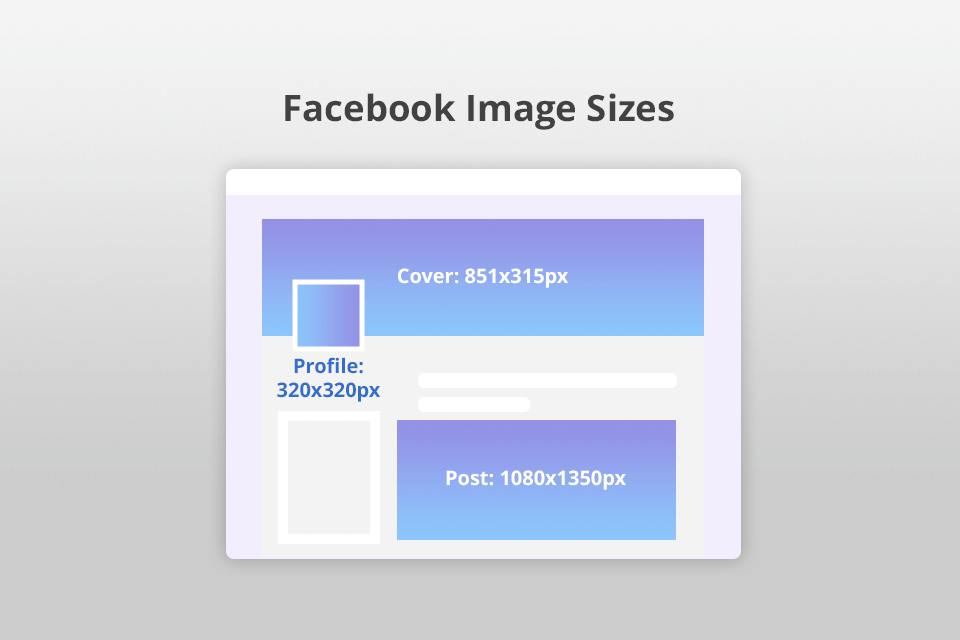
Profile: 320 by 320px. It’s shown as 176 by 176px on PCs and laptops, 196 by 196px on smartphones, and 36 by 36px on feature telephones.
Cover: 851 by 315px. It’s displayed as a 820 by 312px image on PC, and 640 by 360px on Apple and Android phones.
Events cover: 1200 by 628px. Stick to the 2:1 aspect ratio.
Group cover: 1640 by 856px. The optimal aspect ratio here is 1.91:1.
Shared images: 1200 by 630 pixels is recommended, and 470 pixels is the minimal accepted width. Such images are shown when the platform creates a box window from a shared link.
Post: 1080 by 1350 pixels. This social network will automatically crop or reduce the size of your photo if you go beyond this resolution so make sure to check it after creating your post.
Stories: 1080 by 1920 pixels. The optimal aspect ratio is 9:16. Additionally, make the top and bottom 14% (or 250 pixels) of space text-less since that area will be covered by your company’s profile image.
Reels: 1080 by 1350 pixels (ideal aspect ratio is 4:5).
Ad: 1200 by 628 pixels. Acceptable aspect ratios include anything from 1.91:1 to 4:5. However, if you plan to add a link, stock photo, or create an Offer ad, the aspect ratio will be capped at 1.91:1.
Instant articles, Marketplace Ad and Messenger Inbox: 1200 by 1200 pixels, meaning you’ll have to use a 1:1 aspect ratio.
Right Column: the minimum picture resolution is 254 by 133 pixels, while the recommended social media picture size here is 1200 by 1200px.
Sponsored Message: 1200 by 628 pixels.
Video ad: 1080 by 1350 pixels (aspect ratio 4:5), 1080 by 1080 pixels (or larger), with acceptable ratios ranging from 16:9 to 9:16.
Video: 1280 by 720 pixels.
Video length: 240 minutes is the duration limit, but the recommended length for most short-form content is 15 seconds.
View all info on the official site
Instagram allows you to upload photos in 3 distinct orientations – square, landscape, and portrait. If your goal is to have a successful Instagram, then your best bet at receiving a lot of traffic is to create a lot of Instagram Reels and Stories. That said, it’s still possible to receive a ton of likes and saves by posting static images and enhancing them with the available filters.
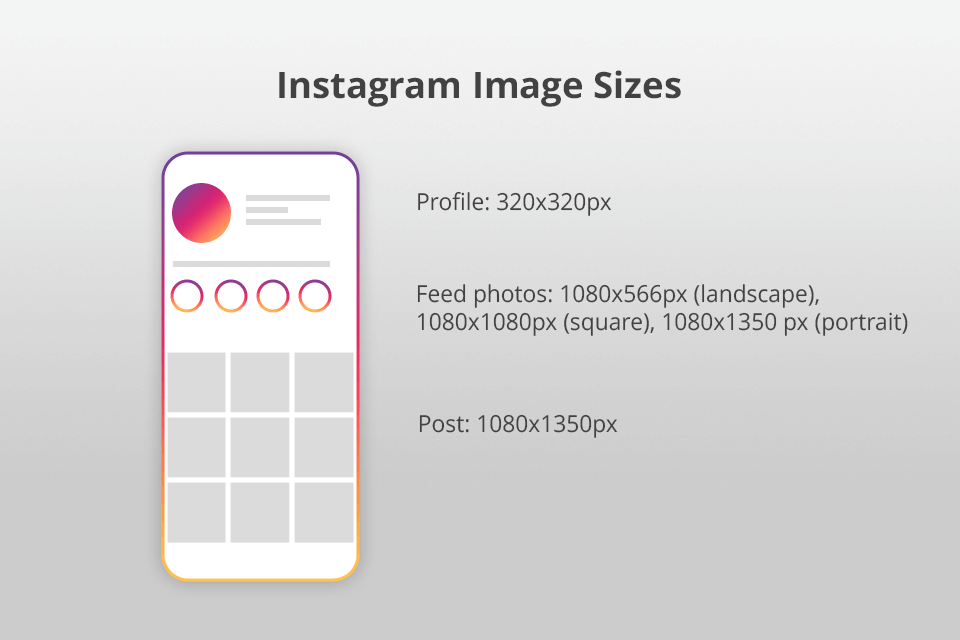
Profile: 320 by 320 pixels. It’s shown in 110 by 100px resolution. Instagram profile photo requirements emphasize the importance of having the main elements in the center of the image since the surrounding area can be cropped out.
Feed photos: 1080 by 566px in the 1.91:1 aspect ratio (landscape), 1080 by 1080px in the 1:1 aspect ratio (square), and 1080 by 1350px in the 4:5 aspect ratio (portrait).
Carousel photo: 1080 by 1080 pixels.
Shared video: 1080 pixels in width.
Stories: 1080 by 1920 pixels | size limit of 4 GB. Optimal aspect ratio is 9:16. For the cover image, consider making the picture 420 by 654px in size.
Minimum Instagram video: 600 by 600 pixels (square), 600 by 315 pixels (landscape), 600 by 750 pixels (portrait), 600 by 700 pixels (Carousel video dimensions)
Minimum Instagram image ad: 500 pixels in width
Ads size: 1080 by 566 pixels (landscape), 1080 by 1080 pixels (square)
IGTV video: 1080 by 1920 pixels
View all info on the official site
If you’re posting a bunch of pictures in a tweet, there are multiple Twitter social media graphic sizes you have to keep in mind. For instance, for a tweet containing 2 pictures, each image has to be 700 by 800 pixels in size, while a 4-image tweet requires a resolution of 1200 by 600 pixels. As you can see, the optimal size depends entirely on the number of posted images.
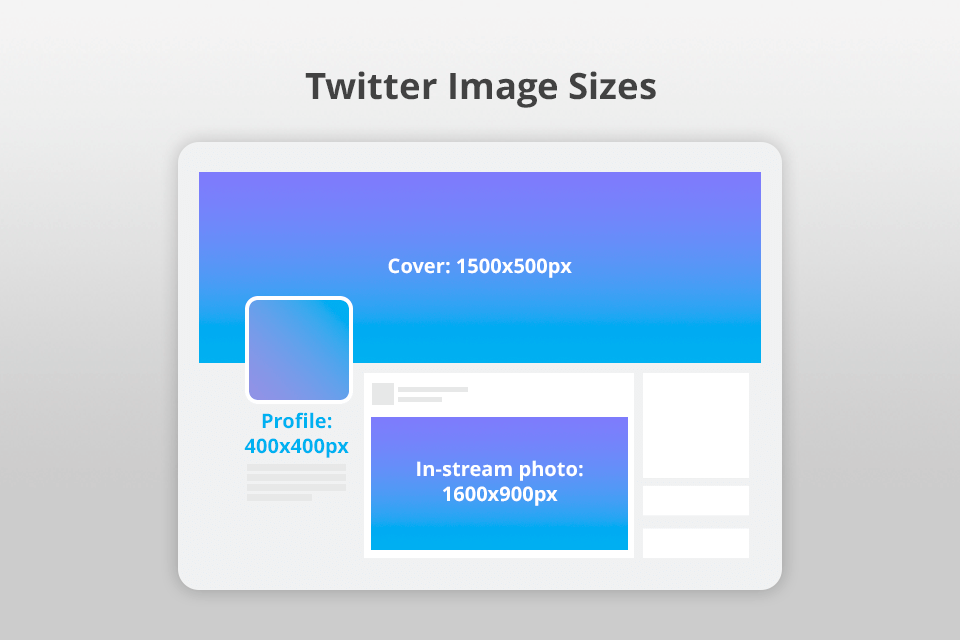
Twitter Profile photo: 400 by 400 pixels | size limit of 2MB
Twitter Cover/Header photo: 1500 by 500 pixels with an aspect ratio of 3:1 | size limit of 5MB
Twitter Timeline/In-stream photo: 1600 by 900 pixels
Live image: 1280 by 720 pixels
Twitter Card image: 300 by 157 pixels with a 2:1 aspect ratio (summary card)
Twitter Video: 720 by 720 pixels (square), 1280 by 720 pixels (landscape), 720 by 1280 pixels (portrait)
Twitter Video length: 140 seconds cap
Twitter Ad (image): 800 by 418 pixels (for site cards), 800 by 800 pixels (for carousels), 800 by 800 pixels (for application card picture), 800 by 418 pixels (for direct message cards), 800 by 418 pixels (for conversation cards).
Twitter Ad (video): 800 by 450 pixels (landscape), 800 by 800 pixels (square).
View all info on the official site
The LinkedIn profile picture is shaped as a circle, meaning it’s very important to use the right image size here. This photo is shown both on your profile page and in the search results. Follow the same advice you do with other similar social media platforms and place the key branding elements in the center of the picture.

LinkedIn Company pages:
Company logo: 300 by 300 pixels
Company cover photo: 1128 by 191 pixels
Dynamic Ads: 100 by 100 pixels (business logo), 1200 x 628 pixels (image)
Sponsored Content image: 1200 by 627 pixels
Hero image: 1128 by 376 pixels
Company Banner image: 646 by 220 pixels
Supported image formats: PNG, JPEG, or GIF
Slideshare file size limit: 100MB
LinkedIn Profile picture: 400 by 400 pixels. The website supports images with resolutions up to 7680 by 4320px. The maximum picture size is 8MB.
LinkedIn Background photo: 1584 by 396 pixels
LinkedIn Post image: 1200 by 1200 pixels (square), 1080 by 1350 pixels (portrait)
LinkedIn Link post: 1200 by 628 pixels
LinkedIn Video: 256 by 144 pixels (minimum) to 4096 by 2304 pixels (maximum)
Maximum LinkedIn video duration: 10 min if imported via the LinkedIn app and 15 min if uploaded from a PC or laptop.
View all info on the official site
If you plan to start a photography blog, then Pinterest can be a great tool for promoting it. There are multiple social media photo sizes you need to consider for this platform. For starters, your profile picture is shown both on your main page and next to each uploaded image. While the former is a square, the picture will usually be shown as a circle.
Additionally, most posts on Pinterest are vertical, which is why you should focus on producing content in portrait orientation rather than landscape. Setting the necessary photo size and orientation is very easy in Adobe Express.
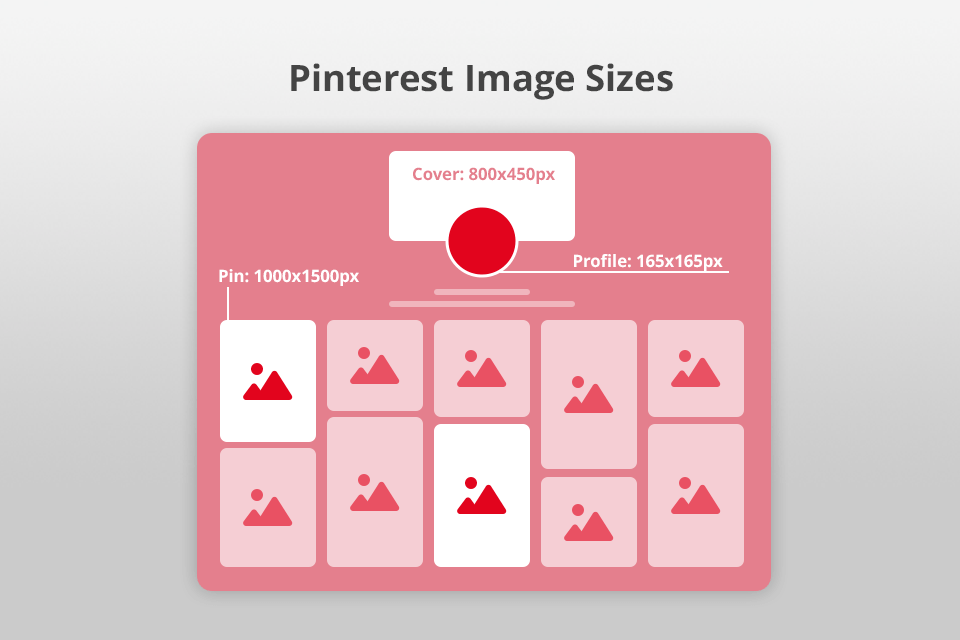
Profile: 165 by 165 pixels | no bigger than 10MB
Cover: 800 by 450 pixels
Board cover: 222 by 150 pixels
Standard Pin: Vertical pictures 1000 by 1500 pixels
Story Pins: 1080 by 1920px
Pinned image preview: 236 pixels
Ads: 1000 by 1500 pixels (app install), 1000 by 1500 pixels (carousel ads and pins), 1000 by 1500 pixels (shopping ads)
Video specs: square (1:1) or vertical (2:3, 9:16) Length: No less than 4sec, maximum of 15min
Promoted Video: square (1:1) or widescreen (16:9) Length: Minimum 4sec, maximum of 15min
Promoted carousels: 2-5 pictures per carousel, aspect ratio: 1:1 or 2:3
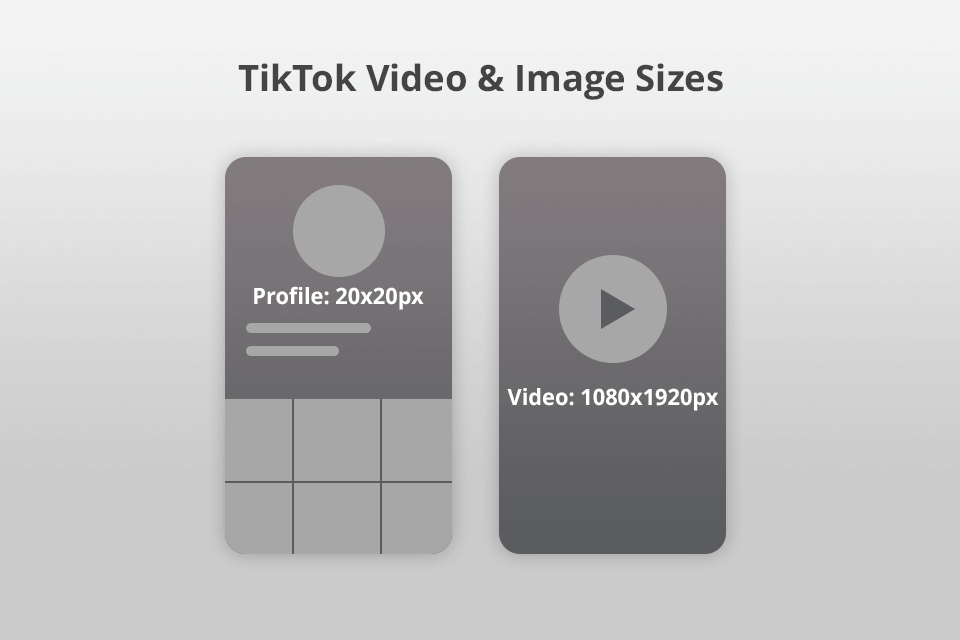
This application allows you to upload vertical clips, which are primarily suited for mobile-oriented marketing strategies. Even though the platform lets you upload a profile picture that is as small as 20x20 pixels, it’s recommended to go higher than that.
Profile: 20 by 20 pixels (or larger)
Video: 1080 by 1920, max duration of 10min. For Android phones – the maximum size is 72MB. For iOS devices – the size limit is 287MB.
In-feed Ad Video aspect ratio: 9:16, 1:1, or 16:9
Video Ads: 720 by 1280 pixels, 640 by 640 pixels, 1280 by 720 pixels.
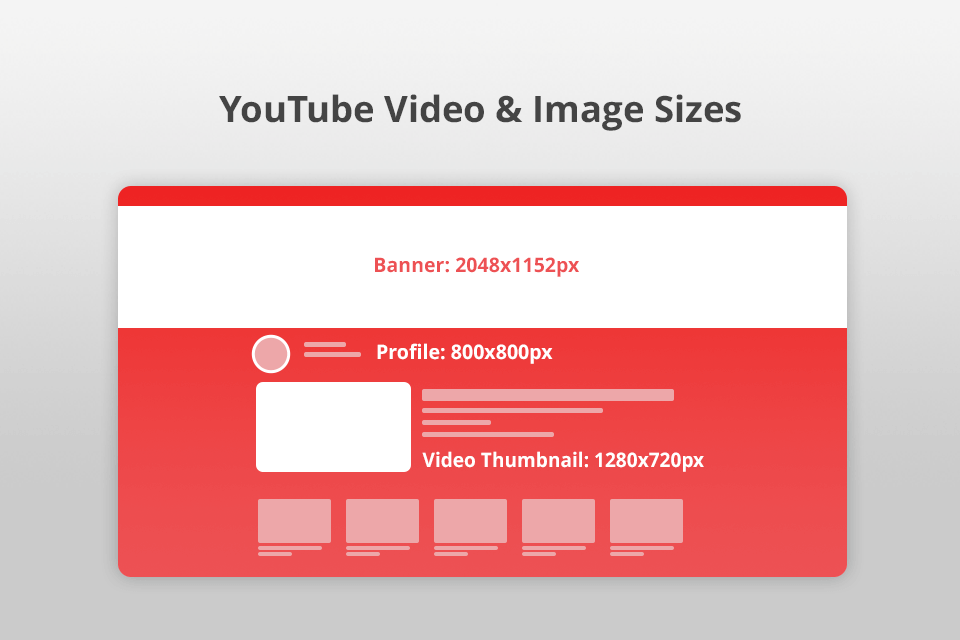
Even though coming up with top-tier YouTube video ideas is your main goal, it’s still vital to pick the best social media image sizes to ensure your visuals aren’t ignored by potential subscribers.
Your profile picture here isn’t as widely featured, but it’s still the face of your brand. Content creators typically set their photo as the avatar while photography studios and businesses use their logos.
Channel header banner: 2560 by 1440 pixels (for PCs and laptops), 1855 by 423 pixels (for tablets), 1546 by 423 pixels (for phones), and 2560 by 1440 pixels (for TVs)
Video: 1280 by 720 pixels
Shorts: 1080 by 1920 pixels
Display ads: 300 by 50 pixels
Overlay ads: 480 by 70 pixels
Companion banner ads: 300 by 250 pixels
Skippable in-stream ads: 1280 by 720 pixels (720p)
Skippable video ads length: Between 6 and 20 seconds
Non-skippable video ads length: 12sec to 3min (30sec is the optimal duration)
Channel profile photo: 800 by 800 pixels
Video Thumbnail: 1280 by 720 pixels
Banner: 2048 by 1152px that has an aspect ratio of 16:9. The max file size is 6 MB.
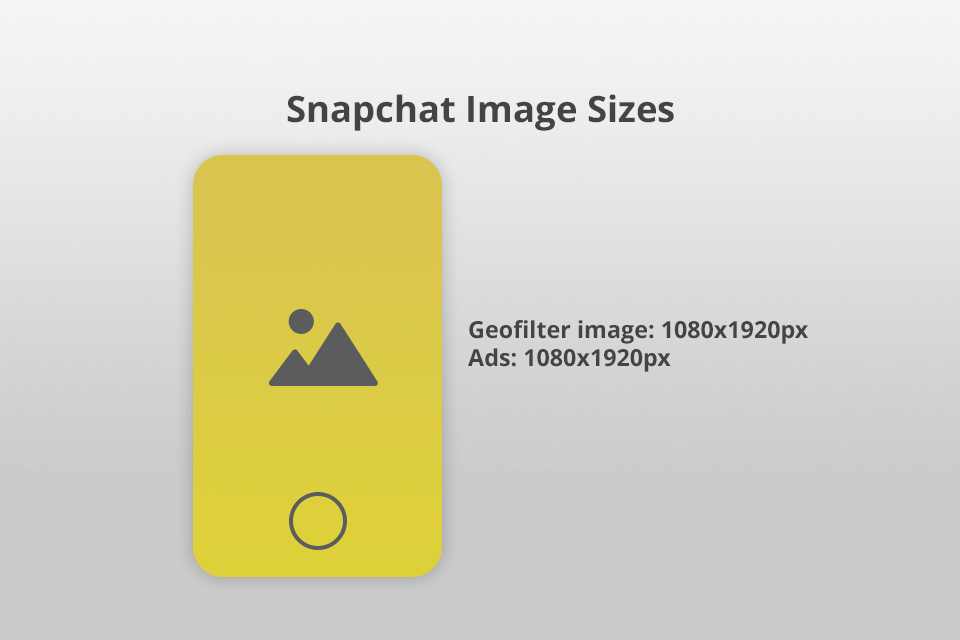
When posting content on Snapchat, don’t feature any logos or other important elements within the upper and lower 150 pixels and 5% of the left and right borders to ensure they don’t clash with other images.
Geofilter image: 1080 by 1920 pixels | max size of 5MB
Ads: 1080 by 1920 pixels
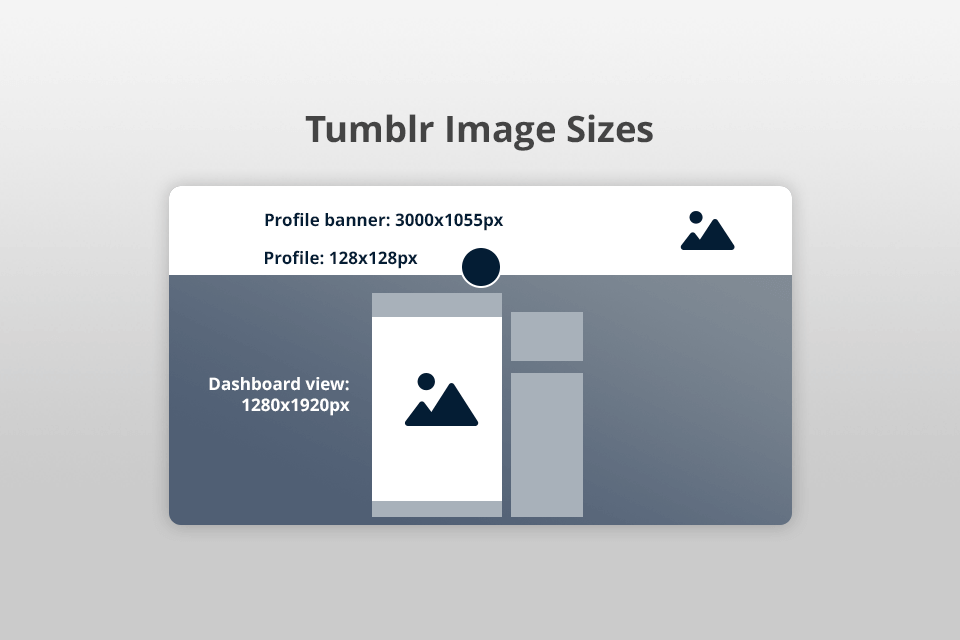
This platform requires you to account for a variety of social media sizes, as it lets you write blog posts, upload images and infographics, clips, and sound files. You also don’t have to think about your image being cropped since Tumblr ensures the profile picture remains square.
Profile: 128 by 128 pixels
Profile banner: 3000 by 1055 pixels
Dashboard view: 1280 by 1920 pixels
Ads: 1280 by 1920 pixels
Photoset: 500 pixels (single image post), 245 pixels (set of 2-3 images), 169 by 169 pixels (audio post thumbnail), 130 by 130 pixels (thumbnail picture).
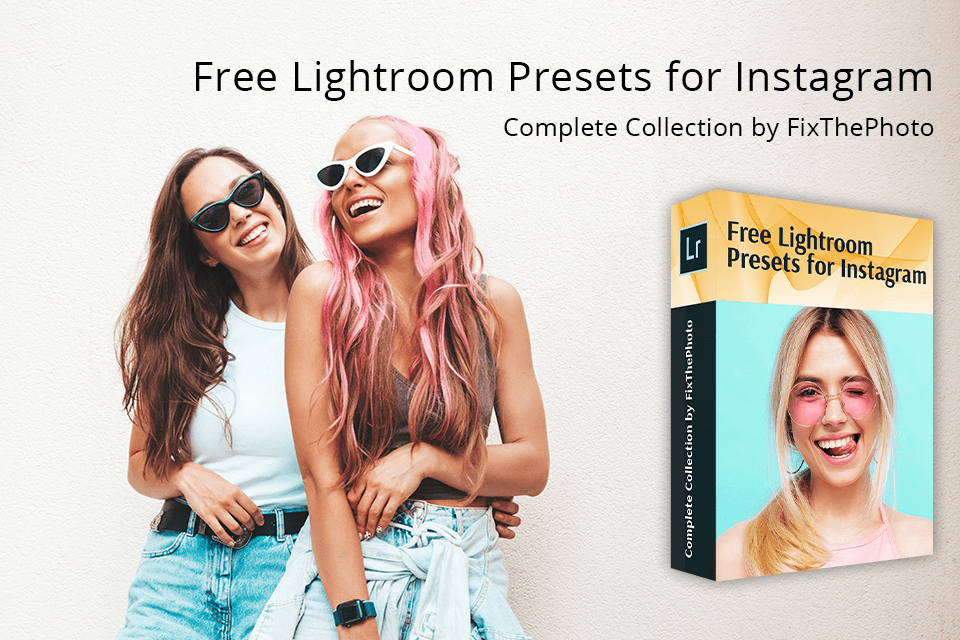
You can use Lightroom to edit pictures for social media while taking advantage of premade presets. With their help, you can make an image brighter, highlight specific tones, or create the desired atmosphere. This bundle is supported by all modern Lightroom versions as well as Lightroom Mobile.